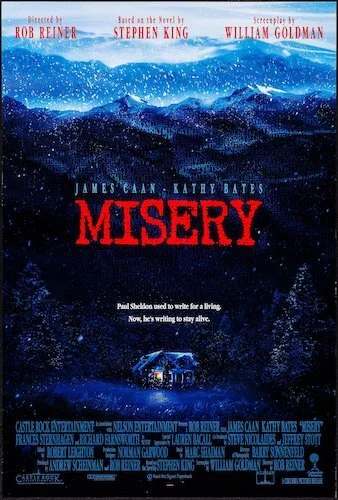Misery: On-This-Day Thursday
Every Thursday, an older film released on this opening weekend years ago will be reviewed. They can be classics, or simply popular films that happened to be released to the world on the same date.
For November 30th, we are going to have a look at Misery.
As far as I’m concerned, there are two saving graces in Rob Reiner’s adaptation of Stephen King’s fanatical horror Misery: its stars, and its source material. Otherwise, Reiner’s usual reliance on colour-by-numbers storytelling and safe aesthetic styles leave this film quite bare, and not in a commandingly raw way or anything either. Remove an Academy Award worthy Kathy Bates, and you might just have someone who is annoying running the show; luckily, her slow revelation of her psychotic nature is sensational. If we also didn’t have James Caan being a moral tug-of-war (between privileged iconic author, and a suffering human being), who knows if the other main role would have been enough to help save this picture. Luckily (if history has told us correctly), Misery found its Paul Sheldon, and it certainly found its Annie `Wilkes (who, thanks to Bates, is pretty much the sole reason that any thriller junkie should even watch this film).
Otherwise, Misery is a bit perplexing. Even in moments that are meant to indicate particular emotions, as much as Reiner adheres to film’s standard, elementary rules, these moments still feel like it is solely the acting that pulls them through. One particular part that sticks out is the infamous “hobbling” sequence. Even with the appropriate cuts, the dynamic angles, and Caan doing his best pain face, something feels a bit lifeless, here; as if this was meant to be the scary scene that it very well is, and yet Reiner couldn’t help but try to make this film for everyone like he always does. I honestly think that some bolder decisions would have made Misery go the complete distance, and never feel restrained. You should be doing more with a confined setting, not less. Maybe more unique, identifiable music, or an experimentation with lighting that doesn’t make everything seem as it would appear in real life. Something. Misery just feels safe, and it’s peculiar that it does, because it houses an iconic villain and sequence that survive in the great halls of horror even with these limitations.
Kathy Bates is at her very best in Misery, and it’s enough to warrant the film a watch.
Otherwise, it’s King — as I stated earlier — pulling through, with proper (albeit common) story structures, and an explosive final act that one could only imagine was derived from King’s own fears of having an obsessive fan base (and the comeuppance of people who don’t understand personal boundaries). It’s the revival of the entire picture, when it was otherwise relying strictly on its leads. I know I’ve brought up how the film is bereft of soul, but I want to clarify that I don’t mean in an impactful way like The Silence of the Lambs, where the world feels cruel (you can easily see how someone like Jonathan Demme fills this void with unmistakable danger, clear intentions of dread, and even a twist via artistic touch). I mean it feels like there was even more in King’s story that got lost in translation.
It’s a shame, because there’s clearly one hell of a depiction of extreme obsession here, and you get its full scope in tiny doses. Misery could have benefited from the psychological angle, of how someone held against their will would imagine the world around them (or the captor slowly going even crazier). Instead, we have Rob Reiner doing what he always does: mimicking source materials as words, not ideas, and with the intention for as many people as possible. This sometimes works (The Princess Bride, When Harry Met Sally…, Stand By Me), but with Misery, this was a clear indication of a misread of the complete capabilities such a tale possessed.
Andreas Babiolakis has a Masters degree in Film and Photography Preservation and Collections Management from Ryerson University, as well as a Bachelors degree in Cinema Studies from York University. His favourite times of year are the Criterion Collection flash sales and the annual Toronto International Film Festival.






